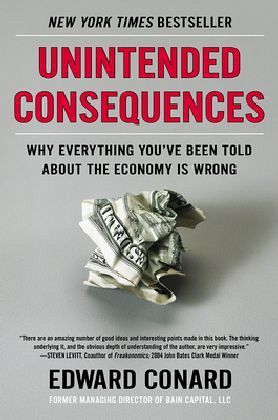"A full-throated defense of economic dynamism. . .refreshing at a time when so many take the failure of capitalism for granted."
- The Wall Street Journal
"Conard offers deep and well-argued analyses on almost every issue."
- The New York Times
"One of the must-read books of the year."
-TYLER COWEN, Marginal Revolution
"...the book, written by a former Bain partner, gives a good overview of the forces behind the financial crisis. It is far smarter and more thought-provoking than most economics written for the general public."
-GREG MANKIW, Professor of Economics, Harvard University, Former Chairman of the Council on Economic Advisors
"There are an amazing number of good ideas and
interesting points made in this book. The thinking underlying it, and the obvious depth of understanding of the author, are very impressive."
-STEVEN LEVITT, Coauthor of Freakonomics; 2004 John Bates Clark Medal Winner
"Conard's contrarian chapter on the benefits of low taxation for the rich is powerfully written. It should be read by anyone who takes for granted the superiority of progressive taxation and has not thought carefully about the trade-offs involved."
- The New Republic
"Edward Conard provides a provocative interpretation of the causes of the global financial crisis and the policies needed to return to rapid growth. Whether you agree or not, this analysis is well worth reading."
-NOURIEL ROUBINI, Chairman, Roubini Global Economics
"Edward Conard's keen business insight and sharp eye on economic forces explain structural strengths and weaknesses of the American economy. While some of his proposed solutions are controversial, the U.S. economy can recover its mojo if policy makers understand Conard's diagnosis."
-GLENN HUBBARD, Dean, Graduate School of Business, Columbia University; Former Chairman, President's Council of Economic Advisers
"Edward Conard's book presents the most cogent and persuasive analysis of the financial crisis to date. It is deeper and likely more accurate than what we have seen so far from journalists, academics, and particularly former government officials."
-ANDREI SHLEIFER, 1999 John Bates Clark Medal winner; Former Editor, Quarterly Journal of Economics; Professor of Economics, Harvard University
"This is a wonderful book, filled with wisdom by a guy who really knows what he's talking bout. It is a must reading for both businessmen and politicians."
-JOHN C. WHITEHEAD, Former Chairman, Goldman Sachs & Co.; Former Deputy Secretary of State
" Unintended Consequences will be the most talked about economic book in 2012. When Ed Conard points the spotlight at recent economic history, his uncanny ability to cut through the confusion provides something totally unexpected: a fresh, nonpartisan perspective on what is right and wrong with America."
-KEVIN HASSETT, Senior Fellow and Director of Economic Policy, American Enterprise Institute
"Edward Conard has written a provocative and important book about the economy that challenges conventional wisdom about the financial crisis, the trade deficit, government policy, and the path to prosperity. I hope policy makers and business leaders will pay close attention to Conard's framework."
-WILLIAM A. SAHLMAN, Senior Associate Dean, Harvard Business School
"Virtually everyone who reads Unintended Consequences will feel the pain of knowing that we may never get EVERYONE to read it. The clarity of Edward Conard's explana tion of where we are, how we got here, and what we do now is profound."
-BILL BAIN, Founder, Bain & Company





